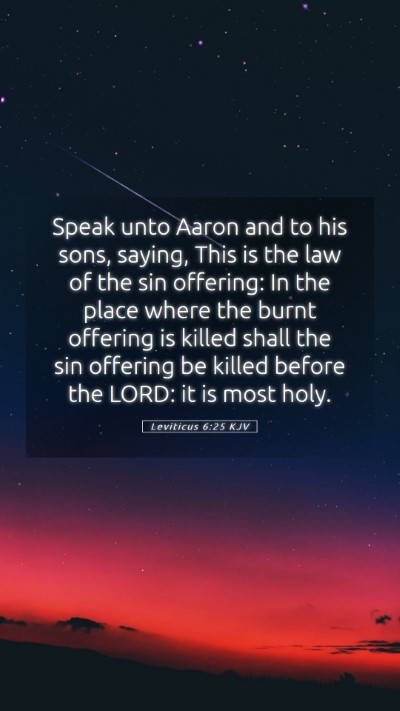Bible Verse Commentary on Leviticus 6:25
Leviticus 6:25 states: "Speak unto Aaron and to his sons, saying, This is the law of the sin offering: In the place where the burnt offering is killed shall the sin offering be killed before the Lord: it is most holy." This verse emphasizes key aspects of the sacrificial system within the Mosaic Law, particularly focusing on sin offerings.
Overview of Leviticus 6:25
This verse outlines the procedural law regarding the sin offerings that reflect God's holiness and the seriousness of sin. Understanding this scripture requires a deeper analysis of its implications in sacrificial practices, as well as its theological significance.
Insights from Commentaries
Taking into account the works of various public domain commentaries, we can elucidate the meaning of Leviticus 6:25.
- Matthew Henry:
- Henry suggests that the sin offering serves as a reminder of the gravity of sin and the necessity of atonement. He conveys that the act of killing the offering signifies the death that sin brings.
- He emphasizes the importance of appropriateness in the location of the sin offering, illustrating God's intentional design in establishing worship and sacrifice, as it should be presented in a place that is esteemed and holy.
- Albert Barnes:
- Barnes focuses on the phrase "most holy," asserting that the sin offering is set apart for divine purposes. He explains that the holiness of the offering echoes the holiness of God, establishing a vital connection between the sacrificial system and God's nature.
- Additionally, Barnes highlights the necessity for proper execution in sacrificial rites, underscoring that offerings are not mere rituals but require sincerity and alignment with God’s commands.
- Adam Clarke:
- Clarke examines the historical context of the sin offering, linking it to the broader framework of Israelite worship and community. He suggests that the law surrounding the sacrificial system was essential for maintaining a covenant relationship with God.
- He also points out the communal aspects of the sin offering, indicating that these sacrifices reflect the collective need for atonement and the consequences of sin within the community of Israel.
Theological Implications
The implications of this verse extend beyond the ritualistic aspects to a deeper understanding of sin, atonement, and divine holiness. It reveals the necessity for sacrifice in seeking reconciliation with God and sets the stage for New Testament themes of redemption through Christ.
Practical Applications
When considering how to apply the meanings from Leviticus 6:25 in our lives, one can reflect on the context of personal sin, the importance of repentance, and the reverence required in approaching God.
Cross References
This verse can be cross-referenced with:
- Leviticus 4:3-12 – Discusses the specifics of sin offerings.
- Hebrews 9:22 – Highlights the significance of blood in atonement.
- Ezekiel 18:30 – Calls for repentance and turning away from sin.
Conclusion
In summary, Leviticus 6:25 reinforces the holiness of God and the seriousness of sin, emphasizing the necessity of sacrifice for atonement. It invites believers to contemplate their relationship with God and understand the weight of their actions. Engaging with this verse through study and reflection can deepen one's faith and commitment to understanding Scripture.


